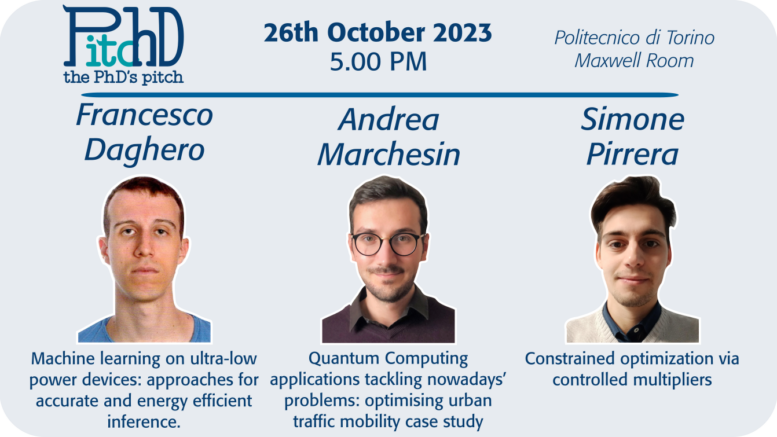26th October 2023 – 5.00 PM
Politecnico di Torino – Maxwell Room
Here’s the 4th PitchD – the PhD’s pitch. Our PhD IEEE Student Members explain to students, colleagues and professors their research in-presence. Please, remember that registration is required to attend the event.
Machine Learning on Ultra-Low power devices: approaches for accurate and energy-efficient inference
Mr. Francesco Daghero
Dept. of Automation and Control Engineering (DAUIN), Politecnico di Torino
Biography: Francesco Daghero received a B.Sc and a M.Sc degree in Computer Engineering at the Politecnico di Torino in 2017 and 2019. In 2020 he joined the Department of Control and Computer Engineering at the Politecnico di Torino initially as a Research Assistant, then as a PhD candidate.
Francesco’s main research interests are in the field of Machine Learning for edge devices and Industry 4.0.
Abstract: In the last years, Machine Learning (ML) has become the core of many emerging Internet of Things (IoT) applications, ranging from computer vision to time-series classification.
On-device processing of ML models’ inference has become increasingly popular, since avoiding partially or entirely the transmission of the collected data to the cloud, it may lead to lower latency, improved privacy and possibly higher energy efficiency.
However, directly moving ML models to edge devices is often unfeasible due to the gap between the computational and memory requirements of the models and the constrained resources available on IoT nodes.
This presentation will describe the process of adapting ML models for seamless integration into the embedded world. It will introduce a range of techniques, including mixed-precision quantization, binarization, and adaptive inference, which effectively diminish energy consumption and memory requirements while maintaining a high level of accuracy.
Quantum Computing applications tackling nowadays’ problems: optimising urban traffic mobility case study
Mr. Andrea Marchesin
Dept. of Electronics and Telecommunications (DET), Politecnico di Torino
Biography: Andrea Marchesin (Graduate Student Member, IEEE) received the B.Sc. and M.Sc. degrees in electronic engineering in 2018 and 2020, respectively, from Politecnico di Torino, Italy, where he is currently working toward the Ph.D. degree in electrical, electronics and communications engineering.
He is involved in research projects on both quantum computing algorithms and platforms, as well as advanced logic-in-memory architectures. His research interests include the quantum world, digital design, and computer-aided design tools development for the exploration of innovative electronic systems.
Abstract: In the last decades, Quantum Computing (QC) has emerged as an innovative research domain that opens the perspective of a revolutionary approach to addressing complex tasks that traditional processing systems cannot handle. In particular, quantum optimisations are receiving special attention due to the ubiquitous nature of such problems and the difficulty of resolving them through classical techniques. Nowadays, there is ongoing research to identify new applications with a quantum advantage. In this regard, one area that has garnered attention is urban traffic, which remains a persistent concern for cities, harming both the environment and the Quality of Life (QoL) of citizens. During this talk, a novel approach leveraging the power of QC will be discussed to deliver a near-term application that can significantly improve traffic flow and reduce congestion in large modern urban areas, with benefits sought for the environment, the economy, and the QoL of people living there.
Study and development of a real-time pilot performance monitoring system
Mr. Samuele Pirrera
Dept. of Automation and Control Engineering (DAUIN), Politecnico di Torino
Biography: Pirrera Simone received his bachelor’s degree in electronic engineering in 2019 and the master’s degree in mechatronic engineering in 2021, both from Politecnico di Torino. Currently, he is a Ph.D. student in the System Identification and Control (SIC) group of the Department of Control and Computer Engineering (DAUIN) in Politecnico di Torino.
His main interests are related to system identification, robust and data-driven control, mathematical optimization, and machine learning.
Abstract: There is a longstanding interest in studying the convergence of optimization algorithms via continuous-time systems theory. We propose a theoretical framework based on control systems theory to develop novel optimization algorithms for constrained optimization. Specifically, given an equality-constrained non-convex optimization problem, we define a continuous-time system whose equilibrium point satisfies the first-order optimality conditions. In this system, we interpret the Lagrange multipliers as the inputs, while the outputs are the values that the constraints assume. Our main contribution is to show that a suitable control strategy applied to this system provides stable dynamics which converge to a stationary point. We decline the approach to two cases: PI-control and feedback linearization. We conduct theoretical analysis to show convergence properties and propose numerical examples demonstrating the method’s practical effectiveness.
Download the flyer:
![]()


